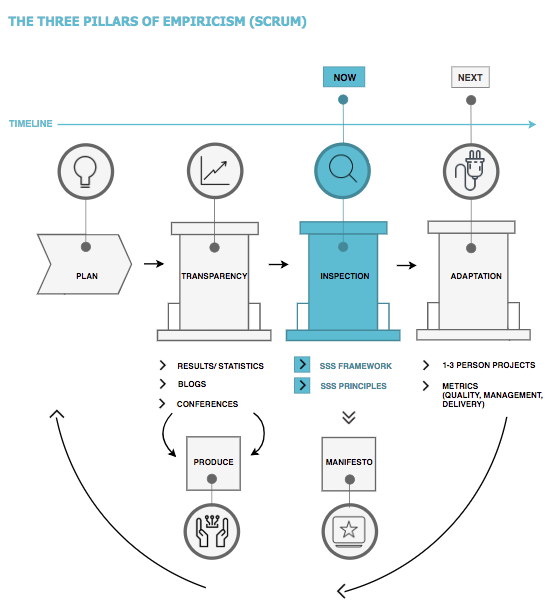4.5 KiB
Testing Small Scale Scrum in the real world
We plan to test the Small Scale Scrum framework in real-world projects
involving small teams.

Scrum is built on the three pillars of inspection, adaptation, and transparency. Our empirical research is really the starting point in bringing scrum, one of the most popular agile implementations, to smaller teams. As presented in the diagram below, we are now taking time to inspect this framework and principles by testing them in real-world projects.
Progress in empirical process control
We plan to implement Small Scale Scrum in several upcoming projects. Our test candidates are customers with real projects where teams of one to three people will undertake short-lived projects (ranging from a few weeks to three months) with an emphasis on quality and outputs. Individual projects, such as final-year projects (over 24 weeks) that are a capstone project after four years in a degree program, are almost exclusively completed by a single person. In projects of this nature, there is an emphasis on the project plan and structure and on maximizing the outputs that a single person can achieve.
We plan to metricize and publish the results of these projects and hold several retrospectives with the teams involved. We are particularly interested in metrics centered around quality, with a particular emphasis on quality in a software engineering context and management, both project management through the lifecycle with a customer and management of the day-to-day team activities and the delivery, release, handover, and signoff process.
Ultimately, we will retrospectively analyze the overall framework and principles and see if the Manifesto we envisioned holds up to the reality of executing a project with small numbers. From this data, we will produce the second version of Small Scale Scrum and begin a cyclic pattern of inspecting the model in new projects and adapting it again.
We want to do all of this transparently. This series of articles is one window into the data, the insights, the experiences, and the reality of running scrum for small teams whose everyday challenges include context switching, communication, and the need for a quality delivery. A follow-up series of articles is planned to examine the outputs and help develop the second edition of Small Scale Scrum entirely in the community.
We also plan to attend conferences and share our knowledge with the Agile community. Our first conference will be Agile 2019 where the evolution of Small Scale Scrum will be further explored as an Experience Report. We are advising colleges and sharing our structure and approach to managing and executing final-year projects. All our outputs will be freely available in the open source way.
Given the changes to recommended team sizes in the Scrum Guide, our long-term goal and vision is to have the Scrum Guide reflect that teams of one or more people occupying one or more roles within a project are capable of following scrum.
Leigh Griffin will present Small Scale Scrum at Agile 2019 in Washington, August 5-9, 2019 as an Experience Report. An expanded paper will be published onAgile Alliance to accompany this.
via: https://opensource.com/article/19/4/next-steps-small-scale-scrum
作者:Agnieszka Gancarczyk (Red Hat)Leigh Griffin (Red Hat) 选题:lujun9972 译者:译者ID 校对:校对者ID
